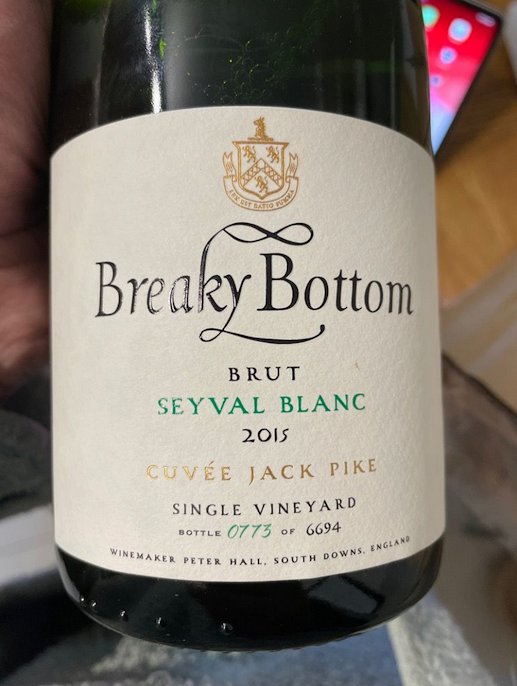Sunday, December 17, 2023
JD's 2023 Advent Calendar (17) - Elvis!
Saturday, December 16, 2023
WEEKENDER: Wiggia on British champagne-style wines
English Sparkling Wine: a Renaissance
My enforced restriction in drinking has meant no Christmas best buys this year, but I have managed to sample a lot of English sparkling wines, simply because they agree with me and are ever more available.
No longer can they be called a poor facsimile of champagne: they are a worthy comparison in their own right.
Climate change has over time made the champagne region begin to worry about the long term future for grape growing. This of course like all weather predictions could turn out to be a blind alley[ only time will tell. More worrying for the champagne houses is he cost of land: in recent years it has become astronomical as any land for vine production has to be within the designated area to be allowed to use the term champagne and there simply isn’t any left.
So small growers are selling up to the big houses and getting out of the business altogether, receiving offers they can’t refuse, leaving an ever smaller number of big growers and owners to dominate the business.
Even among the big boys expansion is limited so other areas are being considered and the South Downs in particular is a target for these outfits. No they can’t call it champagne but if the product is good enough it will sell regardless and what is now being produced in England more than holds its own on the world stage re sparkling wines. A few years ago we would have laughed at such a thought but here we are with some world class bottles.
Price was a big stumbling block for English wine and still is for still wines but the premium paid for sparklers puts them in a different category. No they can never compete with the cheaper Cava and Prosecco and other sparklers from the New World, but by concentrating on the premium end of the market the tax differences are to a great extent evened out and we certainly do compete.
Where we really excel is in vintage sparklers and we have a lot of them. In France the vintage bottles can reach eye watering levels of cash necessary to purchase them which is why most champagne is Non Vintage NV.
We do have NV sparkling here but the vintage section is where it gets interesting. Whilst being a vintage sparkler does not guarantee quality it does guarantee a more interesting product as each vintage has its own nuances. NV wines are blended from different vintages to get a more uniform standard in the bottle i.e. you know after buying brand x that any year is going to be in the same mould as previous wines; many people prefer that approach ‘a reliable taste and product that they can recognise’.
Although grapes used here do not have to conform with the champagne rules, that is a blend of Chardonnay, Pinot Noir and Pinot Meunier, Blanc de Blanc champagne is Chardonnay only, surprisingly there are eight grapes allowed in champagne the others are Pinot Gris, Pinot Blanc, Petit Meslier, Arbane in very small quantities, and Voltis.
Outside of France many other grape varieties are used to make sparkling wine. Prosecco is made using the grape of the same name and Cava using Macabeo, Parellada, and Xarel-lo plus the champagne grapes are being added to the mix.
But back to the UK: the best of the country's sparklers are from the mainly chalk South Downs. Such has been the success that the French are buying land there partly to offset climate change and more likely to pick up relatively cheap acreage compared with home that can grow the grapes as well as champagne. Tattinger and Pommery plus Henkell Freixinet the German Spanish giant are the big players and Tattinger have released their first vintages here.
The best of the UK's vineyards are well spread across the south. Those with a big coverage and seen in supermarkets are the likes of Chapel Down, usually the cheapest but no drop in quality for the price, Ridgeview, and Nyetimber are the most prolific and none are to be sneezed at. Gusborne owned mainly by Lord Ashcroft do a range of sparklers including probably the best of them all a Blanc de Blanc a pricy £65 yet it is as good as any French equivalent; they even do a limited edition at £195 a bottle called Fifty One Degrees North, a lot of money for any champagne styled wine, yet their cheaper cuvees are a good to excellent buy and a special edition for Waitrose I can vouch for, but you won't go wrong with any of their offerings.
Many of the smaller vineyards do great work and turn out excellent wines. A short list of those I have sampled and liked includes Hambledon, Wiston who also do a splendid rose, Hush Heath another who do a splendid rose, Hattingley Valley, Camel Valley, plus many more all good and Waitrose have by far the largest range.
My own favorite is the one in the header above made from the Seval Blanc grape, a vintage wine that improves with age and is so smooth; their Chardonnay version is not to be sniffed at either.
So at Christmas give our own winemakers a go, you will be happily surprised.
